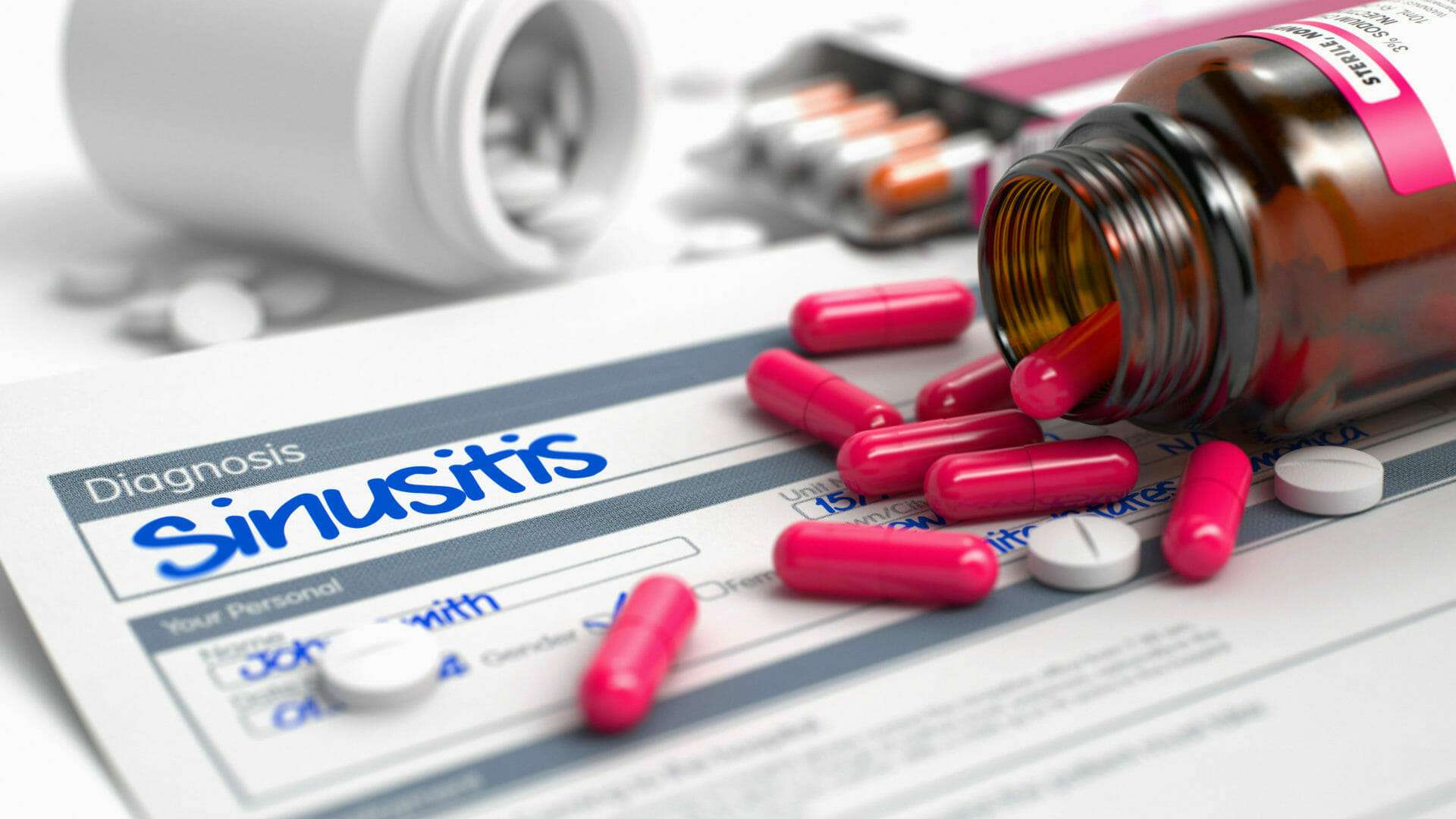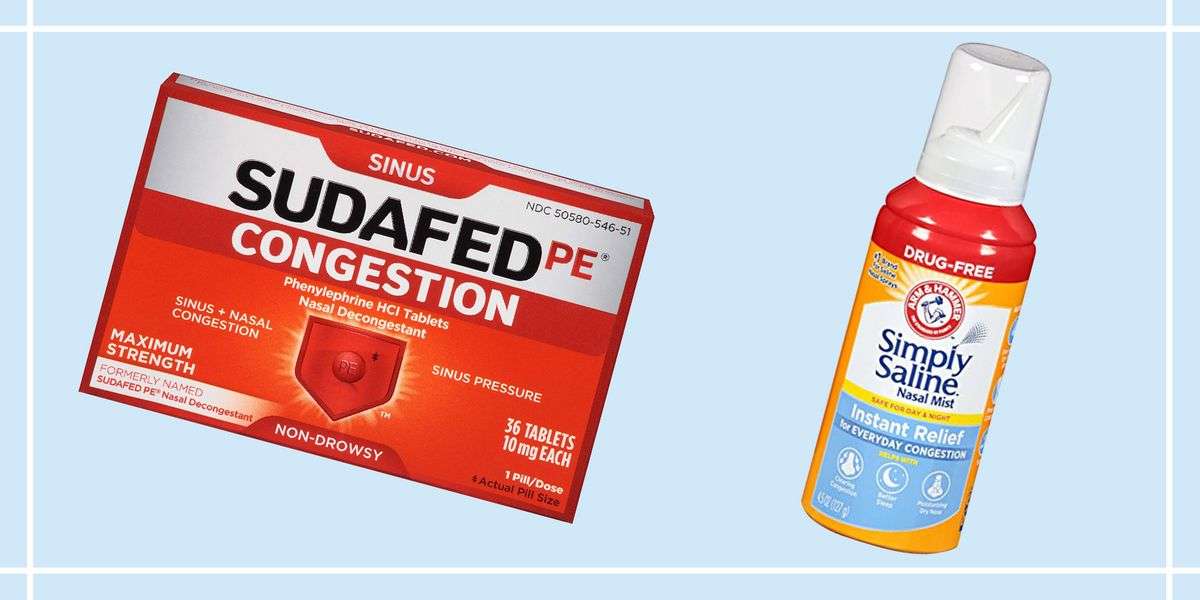When Should You Use Antibiotics
You usually need an antibiotic when you have an infection that is caused by bacteria, and the infection is not going away on its own. This may be the case when:
- Your symptoms last more than 10 days.
- Your symptoms start to get better, but then get worse again.
- Your symptoms are very severe. You should get immediate treatment if:
- You have severe pain and tenderness in the area around your nose and eyes.
- You have signs of a skin infectionsuch as a hot, red rash that spreads quickly.
- You have a fever over 102°F.
What To Do For Chronic Sinusitis
If youre suffering from chronic sinusitis or you are getting frequent sinus infections you should see your doctor, says Dr. Sindwani.
Your doctor will swab your nose to collect mucus. Culturing it in a laboratory will reveal which type of bacteria is causing the infection so the right antibiotic can be prescribed.
Treat early sinus infection symptoms with rest, hydration and over-the-counter sprays and decongestants. But dont look for an antibiotic unless your illness extends beyond a week, he says. Then check in with your doctor for a prescription and let him or her know if your condition worsens.
Will My Sinus Infection Clear Up On Its Own
The first few weeks of the common cold arent fun, but the acute sinusitis that can pop up afterwards doesnt help either. Sinus congestion and the common cold, unfortunately, go hand in hand. Acute sinusitis frequently is caused by the common cold, but also can be caused by allergies and bacterial and fungal infections.
Sinus infections are caused when the cavities around your nasal passages become inflamed and swollen, which eventually interferes with drainage and causes mucus to build up. This tends to get annoying, because it makes breathing through the nose difficult. It also affects the area around your eyes and face, and can cause a throbbing headache.
When a sinus infection hits, its always worse than what you remembered from the last time you had one. This may give you the idea that you need antibiotics, but most clear up without them. Antibiotics have no effect on viruses and arent recommended within the first week of developing a cold. About 70 percent of sinus infections go away within two weeks without antibiotics.
Consider these other forms of treatments instead of antibiotics:
- Over-the-counter pain relievers. Aspirins, acetaminophen or ibuprofen can help relieve temporary pain.
- Saline nasal spray. This is used to spray into your nose several times a day to rinse your nasal passages. They can help to prevent and treat inflammation.
Antibiotics only will be needed if the infection is severe, recurrent or persistent.
Topics in this Post
Also Check: How To Stop An Ear Infection From Getting Worse
When Do I Really Need Antibiotics For A Sinus Infection
When do I really need antibiotics for a sinus infection? is a question many patients have when suffering from bothersome sinus and allergy problems. While sinus infections can be quite painful, antibiotics often do not help in treating the condition.
Sinus infections affect approximately 37 million people in the U.S. each year and can be caused by:
- Viruses
- Nasal polyps or deviated septum causing nasal obstruction
- Irritants/pollutants
The majority of sinus infections are viral in nature, and antibiotics do not cure viral infections. Taking antibiotics for viral infections also will not:
- Keep you from being contagious to others
- Relieve symptoms or make you feel better
In order to distinguish a bacterial sinus infection from an infection caused by a virus or other contributing factor, your doctor will observe your symptoms and possibly conduct other tests, such as a CT scan or cultures.
Antibiotics are only effective on bacterial infections, and even in cases involving bacteria, the body can often cure itself of mild or moderate infections within a few days.
Sinus Infection Treatment Timeline With Antibiotics

Our sinuses are hard to reach, so it can be two to three days before antibiotic treatment begins to take effect.
It is critical to continue the whole course of antibiotics, even if you start to feel better. If you dont finish the whole course, your body could begin to build a resistance to those antibiotics. This makes future treatment more difficult.
Sometimes, patients experience negative side effects while taking antibiotics. If you experience rash, hives or have difficulty breathing while taking antibiotics, call your doctor immediately. You may be experiencing an allergic reaction. In older adults, some types of antibiotics may cause inflammation in tendons.
In addition to clearing your sinuses of infection, antibiotics also work in other parts of your body, particularly the gut. This could cause diarrhea, so you may want to take a probiotic as well.
Recommended Reading: Doxycycline Dosage For Sinus Infection In Adults
Sore Throat And Hoarse Voice
Postnasal drip can leave you with a raw and aching throat. Although it may start as an annoying tickle, it can get worse.
If your infection lasts for a few weeks or more, mucus can irritate and inflame your throat as it drips, resulting in a painful sore throat and hoarse voice. Frequent coughing and throat clearing can make a hoarse voice worse.
How To Treat A Sinus Infection Without Antibiotics
Before you consider antibiotics, a sinus infection can be treated without leaving at home. Some of the home remedies to treat a sinus infection without antibiotics include:
Read Also: How To Alleviate Bladder Infection Pain
When Does Antibiotic Resistance Occur
Antibiotic resistance occurs in a persons own body and within the community when certain drugs no longer work for a specific type of germ. This can occur when bacteria change in response to exposure to antibiotics so that the antibiotics no longer work efficiently against the bacteria.
Therefore, allergists and other specialists recommend limiting the use of antibiotics unless:
- Symptoms last over seven to 10 days
- Specific symptoms are present
- A fever is present
Runny Nose And Postnasal Drip
When you have a sinus infection, you may need to blow your nose often because of nasal discharge, which can be cloudy, green, or yellow. This discharge comes from your infected sinuses and drains into your nasal passages.
The discharge may also bypass your nose and drain down the back of your throat. You may feel a tickle, an itch, or even a sore throat.
This is called postnasal drip, and it may cause you to cough at night when youre lying down to sleep, and in the morning after getting up. It may also cause your voice to sound hoarse.
Don’t Miss: Hiv Yeast Infection In Mouth
Do I Need Antibiotics For A Sinus Infection
Sinus infections can be extremely frustrating, especially when you have a headache and facial pain that doesnt go away, coupled with the inability to breathe through your nose. You want immediate relief, but unfortunately, it takes at least a few days to start feeling better. You may think you need to go to the doctor and get antibiotics for a sinus infection, but this isnt always the case.
In the winter months, sinus infections, colds, bronchitis, pneumonia, the flu, and other respiratory infections are common. Patients think that if they come down with an illness, they will require antibiotics. However, most sinus infections dont require antibiotics.
Most Sinus Infections Dont Require Antibiotics
Ah, . The New England Journal of Medicine published a clinical practice review of acute sinus infections in adults, that is, sinus infections of up to four weeks. The need for an updated review was likely spurred by the disconcerting fact that while the vast majority of acute sinus infections will improve or even clear on their own without antibiotics within one to two weeks, most end up being treated with antibiotics.
It is this discrepancy that has clinical researchers and public health folks jumping up and down in alarm, because more unnecessary prescriptions for antibiotics mean more side effects and higher bacterial resistance rates. But on the other hand, while 85% of sinus infections improve or clear on their own, theres the 15% that do not. Potential complications are rare, but serious, and include brain infections, even abscesses.
You May Like: Should I Go To The Doctor For Sinus Infection
Definition Of Sinusitis Antibiotics
Mainly, doctors prescribe antibiotics to treat up bacterial infections because of its anti bacterial nature. So, we can say that these drugs have potential to kill off the bacteria that generally are called bactericidal or bacteriostatic. Furthermore, one should understand that it do not do anything viral infections like flu etc. For sinusitis treatment, use of antibiotics is a common practice and the selection of this medication depends upon the type of sinusitis a patient suffers from. You can see classification of sinusitis antibiotics below.
- Macrolides
- Fluoroquinolones
- Cephalosporins
These are very popular antibiotics in the market and one can easily get it from nearby drug store.
Untreated Sinus Infection Risks

Sinus infections often start to improve on their own after about 10 days. If your symptoms last longer without improving or if they worsen, a doctor may need to treat the underlying cause of the infection.
If a sinus infection affects a sinus cavity close to the brain, it can spread to the brain if left untreated. Though rare, an infection can also pass into the eye socket and cause vision changes or blindness. These types of infections are more common in kids.
While uncommon, a serious fungal sinus infection left untreated may pass into the bones.
Make an appointment with a doctor if you have severe symptoms, or if the following symptoms last longer than 10 days or keep coming back:
- fever
- congestion
- facial pain
Because the cause of your sinus infection can affect your treatment options, its important to see a doctor for a diagnosis. The Healthline FindCare tool can provide options in your area if youre looking for a doctor.
If you believe you have chronic or recurring sinusitis, consider asking for a referral to an otolaryngologist, also known as an ear, nose, and throat specialist. You may need imaging and other tests to determine the cause of your symptoms.
An ENT specialist can take a culture of nose drainage to better understand the cause of an infection. The ENT specialist can also examine the sinuses more closely and look for any problem in the structure of the nasal passages that could lead to chronic sinus problems.
Read Also: Best Over The Counter Tooth Infection Medicine
But Sometimes Antibiotics For Sinus Infections Are Needed
So how does one judge when it is appropriate to prescribe antibiotics for a sinus infection? There are several sets of official guidelines, which are all similar. When a patient has thick, colorful nasal discharge and/or facial pressure or pain for at least 10 days, they meet criteria for antibiotic treatment. If a patient has had those symptoms, but the symptoms seemed to start improving and then got worse again, then even if its been less than 10 days, they meet criteria for antibiotic treatment.
The authors, however, also suggest that doctors discuss watchful waiting with patients and explain that most sinus infections clear up on their own in one to two weeks, and its a safe option to hold off on antibiotics. The symptoms can then be treated with a cocktail of over-the-counter medications and supportive care, like nasal saline irrigation, nasal steroid sprays, decongestants, and pain medications.
Of course, many patients expect and demand antibiotics for sinus infections, and even those who are open to watchful waiting may hear about the rare but possible complications of things like, oh, brain abscess, and opt to treat.
In the case of my patient above, she met criteria for treatment. She weighed the watchful waiting option against the potential risks of antibiotics for her sinus infection, and chose the prescription. I can tell you from very close follow-up that she improved quickly, though in truth, we will never really know if she would have gotten better anyway.
Whats The Difference Between Sinusitis And Rhinitis In Dogs
Sinusitis is the inflammation of the lining of the sinuses. The sinuses are air-filled, bony cavities that connect with the nasal cavities. During a sinus infection, these cavities become filled with fluid and develop inflamed lining.
Rhinitis is the inflammation of the mucous membranes of the nose. If both the nose and sinus cavities are affected, the term rhinosinusitis is used.
Both of these conditions can occur alone, or as part of an upper respiratory infection. They also appear similar in dogs, causing many of the same signs of illness.
Recommended Reading: Natural Cure For Yeast Infection On Skin
Some Side Effects Can Be Serious If You Experience Any Of These Symptoms Call Your Doctor Immediately:
- rash
- bloody, or watery stools, stomach cramps, or fever during treatment or for up to two or more months after stopping treatment
- stomach tenderness, pain or bloating
- nausea and vomiting
- severe pain in the side and back below the ribs
- painful urination
- urinating more often than usual
- pink, brown, red, cloudy, or bad smelling urine
- swelling in legs and feet
- a return of fever, sore throat, chills, or other signs of infection
- peeling, blistering, or shedding skin
- difficulty swallowing or breathing
- swelling of the throat or tongue
- seizures
Ceftriaxone injection may cause other side effects. Call your doctor if you have any unusual problems while taking this medication.
Antibiotics For Sinus Infection
A sinus infection, also referred to as sinusitis, is more than just having trouble breathing through your nose. Its an infection and inflammation of your sinus cavities.
While most sinus infections are viral and do not require antibiotics, when the infection lasts more than seven to ten days, it may be caused by bacteria and its likely youll need antibiotics.
Read Also: What To Put On Infected Tooth
When Do I Actually Need Antibiotics For A Sinus Infection
There are several guidelines for determining if a patient actually needs antibiotics for a sinus infection. If you have thick, colorful nasal discharge and/or facial pain for at least 10 days, you meet the criteria. This does not mean if you have a slightly yellow or clear nasal discharge for 10 days having discharge from the nose for at least 4 weeks is normal in the case of sinus infections.
The second criterion is if your symptoms have improved but then got worse again, even if its been less than 10 days. This is referred to as double worsening and is a common scenario in bacterial infections. However, even then, you may want to follow what doctors suggest as watchful waiting. Wait 2 weeks and see if symptoms got better. Use over-the-counter medications and supportive care , as they often do the trick.
Which Antibiotics For Sinus Infection Are Most Effective
A leading study reflected various efficacies for each antibiotic commonly prescribed:
90%+ of Amoxicillin, Moxifloxacin & Levofloxacin treatments are effective
70%-80% of Doxycycline, Azithromycin, Erythromycin, Clarithromycin & Cefprozil treatments are effective
50-60% of Cefaclor treatments are effective
80%-90% of High-Dose Amoxicillin, Cefpodoxime Proxetil, Cefixime, and Sulfamethoxazole treatments are effective
Read Also: Natural Remedies For Tooth Infection Swelling
What Are Complications Of Sinus Infection Or Sinusitis
While serious complications do not occur frequently, it is possible for a sinus infection to cause a direct extension of infection into the brain through a sinus wall, creating a life-threatening emergency .
In addition, other adjacent structures can become infected and develop problems, such as osteomyelitis of bones in the skull and infection around the eye . Rarely, these infections may cause death. The most susceptible individuals to complications are patients with suppressed immune systems, diabetes, and relatively rarely from multiple trauma injuries that may occur in natural disasters.
Other Uses For This Medicine

Ceftriaxone injection is also sometimes used to treat sinus infections, endocarditis , chancroid , Lyme disease , relapsing fever , shigella , typhoid fever , salmonella , and Whipple’s disease . Ceftriaxone injection is also sometimes used to prevent infection in certain penicillin-allergic patients who have a heart condition and are having a dental or upper respiratory tract procedure, patients who have fever and are at high risk for infection because they have very few white blood cells, close contacts of someone who is sick with meningitis, and in people who have been sexually assaulted or who have been bitten by humans or animals. Talk to your doctor about the risks of using this medication for your condition.
This medication may be prescribed for other uses ask your doctor or pharmacist for more information.
Read Also: Are There Different Types Of Uti Infections
Research Into Antibiotics And Sinus Infections
The guidelines were triggered, in part, by studies finding that antibiotics may not make a difference. About 60% to 70% of people with sinus infections recover without antibiotics, according to the American Academy of Allergy, Asthma & Immunology.
In one study of symptom relief, patients given antibiotics generally did no better than patients not given antibiotics.
This study, published in the Journal of the American Medical Association, observed 240 patients with sinusitis. They were given one of four treatments: antibiotics alone, nasal steroid spray alone to reduce tissue swelling, both antibiotics and the spray, or no treatment.
Patients who got no treatment were as likely to get better than those who got the antibiotics. The nasal spray seemed to help people with less severe symptoms at the beginning of their sinus problem, and seemed to make those with more intense congestion worse.
The patients all had sinus symptoms that suggested a bacterial infection. Sinus problems are also caused by viruses, for which antibiotics definitely offer no help.